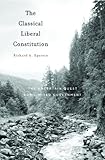The classical liberal constitution : the uncertain quest for limited government / Richard A. Epstein.
Material type: TextPublication details: Cambridge, Massachusetts : Harvard University Press, (c)2014.Description: 1 online resource (xv, 684 pages)Content type:
TextPublication details: Cambridge, Massachusetts : Harvard University Press, (c)2014.Description: 1 online resource (xv, 684 pages)Content type: - text
- computer
- online resource
- 9780674726499
- KF4550 .C537 2014
- COPYRIGHT NOT covered - Click this link to request copyright permission: https://lib.ciu.edu/copyright-request-form
| Item type | Current library | Collection | Call number | URL | Status | Date due | Barcode | |
|---|---|---|---|---|---|---|---|---|
 Online Book (LOGIN USING YOUR MY CIU LOGIN AND PASSWORD)
Online Book (LOGIN USING YOUR MY CIU LOGIN AND PASSWORD)
|
G. Allen Fleece Library ONLINE | Non-fiction | KF4550 (Browse shelf(Opens below)) | Link to resource | Available | ocn865579038 |
Includes bibliographies and index.
Preliminaries -- Our two constitutions -- The classical liberal synthesis -- The progressive response -- Constitutional interpretation: the original and the prescriptive constitutions -- Constitutional structures -- The judicial power -- The legislative power -- The executive power -- Individual rights -- Property, contract, and liberty -- Speech -- Religion -- Equal protection -- The Classical Liberal Alternative.
American liberals and conservatives alike take for granted a progressive view of the Constitution that took root in the early twentieth century. Richard A. Epstein laments this complacency which, he believes, explains America's current economic malaise and political gridlock. Steering clear of well-worn debates between defenders of originalism and proponents of a living Constitution, Epstein employs close textual reading, historical analysis, and political and economic theory to urge a return to the classical liberal theory of governance that animated the framers' original text, and to the limited government this theory supports. Grounded in the thought of Locke, Hume, Madison, and other Enlightenment figures, the classical liberal tradition emphasized federalism, restricted government, separation of powers, property rights, and economic liberties. The most serious challenge to this tradition, Epstein contends, has come from New Deal progressives and their intellectual defenders. Unlike Thomas Paine, who saw government as a necessary evil at best, the progressives embraced government as a force for administering social good. The Supreme Court has unwisely ratified the progressive program by sustaining an ever-lengthening list of legislative programs at odds with the classical liberal Constitution. Epstein's carefully considered analysis addresses both halves of the constitutional enterprise: its structural safeguards against excessive government power and its protection of individual rights. He illuminates contemporary disputes ranging from presidential prerogatives to health care legislation, while reexamining such enduring topics as the institution of judicial review, the federal government's role in regulating economic activity, freedom of speech and religion, and equal protection.
COPYRIGHT NOT covered - Click this link to request copyright permission:
There are no comments on this title.
